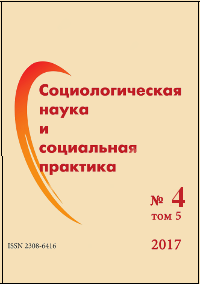Счастье осмысленное и спонтанное
Аннотация
Литература
Аргайл М. Психология счастья. 2-е изд. СПб.: Питер, 2003. 271 с.
Воркачёв С. Г. Концепт счастья: понятийный и образный компоненты // Известия РАН. Серия литературы и языка. 2001. Т. 60. № 6. С. 47-58.
Джидарьян И. А. Психология счастья и оптимизма. М.: Ин-т психологии РАН, 2013. 268 с.
Дилигенский Т. Т Люди среднего класса. М: Ин-т Фонда «Общественное мнение», 2002. 285 с.
Добрынина Е. Как по-русски будет счастье // Российская газета. Федеральный выпуск № 7314 (148). [Электронный ресурс]: Российская газета RG.RU: [веб-сайт]. Электрон. дан. 06.07.2017. URL: https://rg.ru/2017/07/06/uchenye-popytalis-otvetit-na-vopros-chego-rossii- anam-ne-hvataet-dlia-schastia.html (дата обращения: 22.11.2017).
Зараковский Т. М. Качество жизни населения России: психологические составляющие. М.: Смысл, 2009. 320 с.
Козырева П. М., Низамова А. Э., Смирнов А. И. Счастье и его детерминанты (статья 1) // Социологические исследования. 2015. № 12. С. 120—132.
Козырева П. М., Низамова А. Э., Смирнов А. И. Счастье и его детерминанты (статья 2) // Социологические исследования. 2016. № 1. С. 66—76.
Мангейм К. Очерки социологии знания: проблема поколений — состязательность — экономические амбиции. М.: ИНИОН РАН, 2000. 163 с.
О чём мечтают россияне: идеал и реальность / [М. К. Горшков и др.]; Под ред. М. К. Горшкова, Р. Крумма, Н. Е. Тихоновой. М.: Весь Мир, 2013. 400 с.
Российское общество и вызовы времени. Книга вторая / [М. К. Горшков и др.]; отв. ред. М. К. Горшков, В. В. Петухов. М.: Весь Мир, 2015. 432 с.
Счастье есть! [Электронный ресурс]: ВЦИОМ: [веб-сайт]. Пресс-выпуск. № 3362. 26,04,2017. URL: https://wciom.ru/index.php?id=236&uid=116179 (дата обращения: 26.04.2017).
Татаркевич В. О счастье и совершенстве человека. М.: Прогресс, 1981. 365 с.
Тревоги и опасения россиян: какие угрозы в повседневной жизни, жизни страны и мира тревожат людей больше всего? [Электронный ресурс]: ФОМ: [веб-сайт]. 26 апреля 2017 г. Электрон. дан. URL: http://fom.ru/TSennosti/13306 (дата обращения: 22.05.2017).
Философский энциклопедический словарь / Редкол.: С. С. Аверницев, Э. А. Араб-Оглы, Л. Ф. Ильичёв и др. 2-е изд. М.: Советская энциклопедия, 1989. 840 с.
Франкл В. Человек в поисках смысла: Сборник / Пер. с англ. и нем.; Общ. ред. Л. Я. Гозмана и Д. А. Леонтьева; Вст. ст. Д. А. Леонтьева М.: Прогресс, 1990. 368 с.








 Издатель: Федеральное государственное бюджетное учреждение науки
Издатель: Федеральное государственное бюджетное учреждение науки